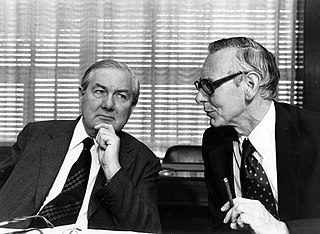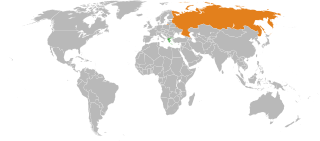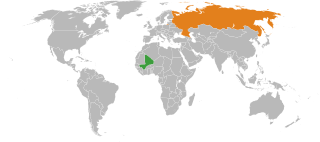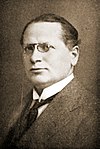The Republic of Estonia gained its independence from the Russian Empire on 24 February 1918 and established diplomatic relations with many countries via membership of the League of Nations. The forcible incorporation of Estonia into the Soviet Union in 1940 was not generally recognised by the international community and the Estonian diplomatic service continued to operate in some countries. Following the restoration of independence from the Soviet Union, Russia was one of the first nations to re-recognize Estonia's independence. Estonia's immediate priority after regaining its independence was the withdrawal of Russian forces from Estonian territory. In August 1994, this was completed. However, relations with Moscow have remained strained primarily because Russia decided not to ratify the border treaty it had signed with Estonia in 1999.

In many countries, the ministry of foreign affairs is the highest government department exclusively or primarily responsible for the state's foreign policy and relations, diplomacy, bilateral, and multilateral relations affairs as well as for providing support, including consular services, for a country's citizens who are abroad. The entity is usually headed by a foreign minister or minister of foreign affairs. The foreign minister typically reports to the head of government.

Andrei Andreyevich Gromyko was a Soviet politician and diplomat during the Cold War. He served as Minister of Foreign Affairs (1957–1985) and as Chairman of the Presidium of the Supreme Soviet (1985–1988). Gromyko was responsible for many top decisions on Soviet foreign policy until he retired in 1988. In the 1940s, Western pundits called him Mr Nyet, or Grim Grom, because of his frequent use of the Soviet veto in the United Nations Security Council.

Abdulaziz Khafizovich Kamilov is an Uzbek politician who was Uzbekistan's Minister of Foreign Affairs from 2012 to 2022. Previously he served in the same post from 1994 to 2003.

The minister of foreign affairs of the Russian Federation is a high-ranking Russian government official who heads the ministry of foreign affairs of the Russian Federation. The foreign minister is one of the five presidential ministers, along with the ministers of defence, interior, emergencies and justice. Although they are members of the Cabinet, they are directly subordinate to the President.

The Ministries of the Soviet Union were the government ministries of the Soviet Union.

The Ministry of Foreign Affairs of the Russian Federation is the central government institution charged with leading the foreign policy and foreign relations of Russia. It is a continuation of the Ministry of Foreign Affairs of the Russian Soviet Federative Socialist Republic, which was under the supervision of the Soviet Ministry of External Relations. Sergei Lavrov is the current foreign minister.

Greco-Russian relations are the bilateral foreign relations between Greece and Russia. The two countries first entered into diplomatic relations in 1828. Both Greece and Russia are members of international organizations and agreements, including the United Nations, Organization for Security and Cooperation in Europe, and the Organization of the Black Sea Economic Cooperation.

Foreign relations between Australia and Russia date back to 1807, when the Russian warship Neva arrived in Sydney as part of its circumnavigation of the globe. Consular relations between Australia and the Russian Empire were established in 1857. Diplomatic relations between Australia and the Soviet Union were established in 1942, and the first Australian embassy opened in 1943. Due to the 2022 Russian invasion of Ukraine, relations became very tense after Australia imposed sanctions against Russia. Russia placed Australia on a list of "unfriendly countries", along with South Korea, the United States, European Union members, NATO members, New Zealand, Singapore, Japan, Switzerland, Micronesia, Canada, Taiwan, and Ukraine.

The Embassy of Australia in Moscow is the diplomatic mission of Australia to the Russian Federation. The current head of post and Ambassador of Australia to the Russian Federation is John Geering. The embassy serves as the diplomatic mission for Australia to the Russian Federation, Armenia, Belarus, Kazakhstan, Kyrgyzstan, Tajikistan, Turkmenistan and Uzbekistan. The chancery is located at 10A/2 Podkolokolny Lane in the Tagansky District of Moscow.

Mali–Russia relations are the bilateral relations between Mali and Russia.

Ghana–Russia relations are the bilateral relationship between the two countries, Ghana and Russia. Russia has an embassy in Accra, and Ghana has an embassy in Moscow. Relations are still very friendly and close.

Russia–Senegal relations are the bilateral foreign relations between Russia and Senegal. Russian has an embassy in Dakar and Senegal has an embassy in Moscow.

The Ministry of Foreign Affairs of the Republic of Kazakhstan is the Kazakh government ministry which oversees the foreign relations of Kazakhstan.

The Ministry of Foreign Affairs of the Republic of Belarus is the Belarusian government ministry which oversees the foreign relations of Belarus.

The Kingdom of Tonga and the Union of Soviet Socialist Republics established formal diplomatic relations in April 1976. The USSR was dissolved in 1991 and was succeeded by the Russian Federation as the successor state.

Nepal–Russia relations are the bilateral relations between Russia and Nepal.

Mauritania–Russia relations are the bilateral foreign relations between the Russian Federation and Mauritania.

Lesotho–Russia relations are the bilateral relations between Russia and Lesotho.

The Ministry of Foreign Affairs of the Union of Soviet Socialist Republics was founded on 6 July 1923. It had three names during its existence: People's Commissariat for Foreign Affairs (1923–1946), Ministry of Foreign Affairs (1946–1991) and Ministry of External Relations (1991). It was one of the most important government offices in the Soviet Union. The Ministry was led by the Minister of Foreign Affairs prior to 1991, and a Minister of External Relations in 1991. Every leader of the Ministry was nominated by the Chairman of the Council of Ministers and confirmed by the Presidium of the Supreme Soviet, and was a member of the Council of Ministers.


























